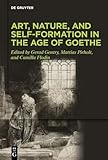Art, Nature, and Self-Formation in the Age of Goethe / ed. by Gerad Gentry, Mattias Pirholt, Camilla Flodin.
Material type: TextPublisher: Berlin ; Boston : De Gruyter, [2024]Copyright date: 2024Description: 1 online resource (VII, 305 p.)Content type:
TextPublisher: Berlin ; Boston : De Gruyter, [2024]Copyright date: 2024Description: 1 online resource (VII, 305 p.)Content type: - 9783110751284
- 9783110751482
- 9783110751383
- 831/.6 23//eng/20241014eng
- online - DeGruyter
- Issued also in print.
| Item type | Current library | Call number | URL | Status | Notes | Barcode | |
|---|---|---|---|---|---|---|---|
 eBook
eBook
|
Biblioteca "Angelicum" Pont. Univ. S.Tommaso d'Aquino Nuvola online | online - DeGruyter (Browse shelf(Opens below)) | Online access | Not for loan (Accesso limitato) | Accesso per gli utenti autorizzati / Access for authorized users | (dgr)9783110751383 |
Frontmatter -- Contents -- Abbreviations -- Introduction -- Part I: Goethe, Faust, and the Power of Tragedy -- Goethe on Tragedy -- Philosophy of Tragedy: Schiller and Hölderlin -- Goethe and Hegel: Faust and the Phenomenology of Spirit -- Part II: Art, Meaning, and Aesthetic Formation -- Artworks as Organic Wholes: A Goethean and Hegelian Concept of Art -- Transparency and Enigma in the Age of Goethe -- Sentimental Symbolism in Goethe’s “Alexis und Dora” -- Part III: Nature and the Divine -- Beautiful Creatures: Schiller and Goethe on Animal Freedom -- Goethe’s Demonic Idealism and Elective Affinities -- The Problem of God in Goethe’s Gott und Welt -- Part IV: Imagination, Memory, and Becoming in the Age of Goethe -- Intuition and Comprehension: Productive Imagination in Fichte and Goethe -- Experiments in Becoming -- Rhythms of Memory: The Mnemosyne Palimpsest -- Contributors -- Index
restricted access online access with authorization star
http://purl.org/coar/access_right/c_16ec
This volume looks to core ideas defining Goethe’s work and his influence on his contemporaries and inheritors. Contributions to this volume explore his impact through ideas of organic and aesthetic formation; methods of biology, reason, becoming, and Bildung; modes of self-conscious comportment to nature, art, and the self; and conceptions of finitude and divinity. This volume underscores the interdisciplinary impact of Goethe’s thought and work. Of particular note is Goethe's unified and non-reductive account of nature, human education, social life, and reason. These contributions shed light on how Goethe's thought furthers the methodological sciences of his day while yielding resources for the grounding of theories of art in principles of idealism as well as imminent critiques of idealism through insights about organic formation and activity. The result is a compelling sense of unity through plurality. Contributors: James Conant, Richard Eldridge, Camilla Flodin, Michael Forster, Gerad Gentry, Keren Gorodeisky, Johannes Haag, Joel Lande, Lara Ostaric, Mattias Pirholt, Anne Pollok, Karin Schutjer, Allen Speight, Joan Steigerwald, Violetta Waibel, David Wellbery.
Issued also in print.
Mode of access: Internet via World Wide Web.
In English.
Description based on online resource; title from PDF title page (publisher's Web site, viewed 20. Nov 2024)


